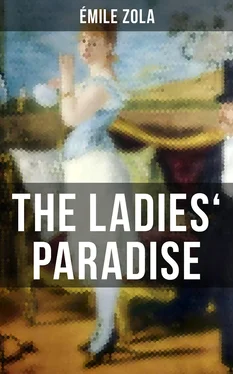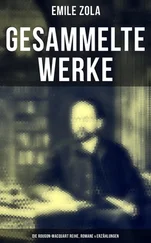“Does he know about it?”
“No, you’ll explain the affair to him yourself,” she replied.
She looked at him, thinking that he couldn’t know anything or he would not employ her in this way with the baron, affecting to consider him simply as an old friend of hers. But he still held her hand, he called her his good Henriette, and she felt her heart melting. Silently she presented her lips, pressed them to his, then whispered: “Oh, they’re waiting for me. Come in behind me.”
They could hear voices issuing from the principal drawing-room, deadened by the heavy curtains. She pushed the door, leaving its two folds open, and handed the fan to one of the four ladies who were seated in the middle of the room.
“There it is,” said she; “I didn’t know exactly where it was. My maid would never have found it.” And she added in her cheerful way: “Come in, Monsieur Mouret, come through the little drawing-room; it will be less solemn.”
Mouret bowed to the ladies whom he knew. The drawing-room, with its flowered brocatel Louis XVI. furniture, gilded bronzes and large green plants, had a tender feminine air, notwithstanding the height of the ceiling; and through the two windows could be seen the chestnut trees in the Tuileries Gardens, their leaves blowing about in the October wind.
“But it isn’t at all bad, this Chantilly!” exclaimed Madame Bourdelais, who had taken the fan.
She was a short fair woman of thirty, with a delicate nose and sparkling eyes, an old school-fellow of Henriette’s, and who had married a chief clerk in the Treasury. Of an old middle-class family, she managed her household and three children with a rare activity and good grace, and an exquisite knowledge of practical life.
“And you paid twenty-five francs for it?” resumed she, examining each mesh of the lace. “At Luc, I think you said, to a country woman? No, it isn’t dear; but you had to get it mounted, hadn’t you?”
“Of course,” replied Madame Desforges. “The mounting’ cost me two hundred francs.”
Madame Bourdelais began to laugh. And that was what Henriette called a bargain! Two hundred francs for a plain ivory mount, with a monogram! And that for a simple piece of Chantilly, over which she had saved five francs, perhaps. Similar fans could be had ready mounted for a hundred and twenty francs, and she named a shop in the Rue Poissonniere.
However, the fan was handed round to all the ladies. Madame Guibal barely glanced at it. She was a tall, thin woman, with red hair, and a face full of indifference, in which her grey eyes, occasionally penetrating her unconcerned air, cast the terrible gleams of selfishness. She was never seen out with her husband, a barrister well-known at the Palais de Justice, who led, it was said, a pretty free life, dividing himself between his law business and his pleasures.
“Oh,” murmured she, passing the fan to Madame de Boves, “I’ve scarcely bought one in my life. One always receives too many of such things.”
The countess replied with delicate malice:!’ You are fortunate, my dear, in having a gallaut husband.” And bending over to her daughter, a tall girl of twenty, she added: “Just look at the monogram, Blanche. What pretty work! It’s the monogram that must have increased the price like that.”
Madame de Boves had just turned forty. She was a superb woman, with the neck of a goddess, a large regular face, and big sleepy eyes, whom her husband, Inspector-General of the Stud, had married for her beauty. She appeared quite moved by the delicacy of the monogram, as if seized with a desire the emotion of which made her turn pale, and turning round suddenly, she continued: “Give us your opinion, Monsieur Mouret. Is it too dear—two hundred francs for this mount?”
Mouret had remained standing in the midst of the five women, smiling, taking an interest in what interested them. He picked up the fan, examined it, and was about to give his opinion, when the footman opened the door and announced:
“Madame Marty.”
And there entered a thin, ugly woman, ravaged with the small-pox, dressed with a complicated elegance. She was of uncertain age, her thirty-five years appearing sometimes equal to thirty, and sometimes to forty, according to the intensity of the nervous fever which agitated her. A red leather bag, which she had not let go, hung from her right hand.
“Dear madame,” said she to Henriette, “excuse me bringing my bag. Just fancy, as I was coming along I went into The Paradise, and as I have again been very extravagant, I did not like to leave it in my cab for fear of being robbed.” But having perceived Mouret, she resumed laughingly: “Ah! sir, I didn’t mean to give you an advertisement, for I didn’t know you were here. But you really have some extraordinary fine lace just now.”
This turned the attention from the fan, which the young man laid on the table. The ladies were all anxious to see what Madame Marty had bought. She was known to be very extravagant, totally unable to resist temptation, strict in her conduct and incapable of yielding to a lover, but weak and cowardly, easily conquered before the least bit of finery. Daughter of a city clerk, she was ruining her husband, a master at the Lycée Bonaparte, who was obliged to double his salary of six thousand francs a year by giving private lessons, in order to meet the constantly increasing household expenses. She did not open her bag, but held it tight on her lap, and commenced to talk about her daughter Valentine, fourteen years old, one of her dearest coquetries, for she dressed her like herself, with all the fashionable novelties of which she submitted to the irresistible seduction.
“You know,” she said, “they are making dresses trimmed with a narrow lace for young girls this winter. So when I saw, a very pretty Valenciennes—”
And she at last decided to open her bag. The ladies were stretching out their necks, when, in the midst of the silence, the door-bell was heard.
“It’s my husband, stammered Madame Marty, very confused. “He promised to fetch me on leaving the Lycée Bonaparte.”
She quickly shut the bag again, and put it under her chair with an instinctive movement. All the ladies set up a laugh. This made her blush for her precipitation, and she put the bag on her knees again, explaining that men never understood, and that they need not know.
“Monsieur de Boves, Monsieur de Vallagnosc,” announced the footman.
It was quite a surprise. Madame de Boves herself did not expect her husband. The latter, a fine man, wearing a moustache and an imperial with the military correctness so much liked at the Tuileries, kissed the hand of Madame Desforges, whom he had known as a young girl at her father’s. And he made way to allow his companion, a tall, pale fellow, of an aristocratic poverty of blood, to make his bow to the lady of the house. But the conversation had hardly recommenced when two exclamations were heard:
“What! Is that you, Paul?”
“Why, Octave!”
Mouret and Vallagnosc then shook hands, much to Madame Desforges’s surprise. They knew each other, then? Of course, they had grown up side by side at the college at Plassans, and it was quite by chance they had not met at her house before. However, with their hands still united, they went into the little drawing-room, just as the servant brought in the tea, a china service on a silver waiter, which he placed near Madame Desforges, on a small round marble table with a light copper mounting. The ladies drew up and began talking louder, all speaking at once, producing a cross-fire of short disjointed sentences; whilst Monsieur de Boves, standing up behind them, put in an occasional word with the gallantry of a handsome functionary. The vast room, so prettily and cheerfully furnished, became merrier still with these gossiping voices, and the frequent laughter.
Читать дальше












